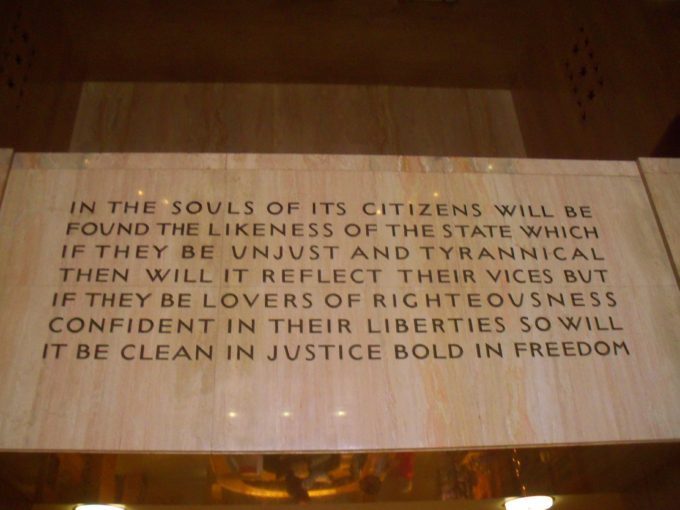
Friday, 26 June 2020
Look to yourselves, that we do not lose those things we worked for, but that we may receive a full reward. 2 John -8
There is a dispute in a few words of this verse. Some manuscripts, instead of saying, “we do not lose,” say, “you do not lose.” Some also say, “you may receive,” instead of saying, “we may receive.” There is even a dispute concerning, “we worked,” as opposed to, “you worked.” The change in pronouns is dismissed by many scholars, but the outcome of what is said shows that we should not be quick to just ignore the changes. Some possibilities –
Look to yourselves, that we do not lose those things we worked for, but that we may receive a full reward.
Look to yourselves, that we do not lose those things we worked for, but that you may receive a full reward.
Look to yourselves, that you do not lose those things we worked for, but that you may receive a full reward.
Look to yourselves, that you do not lose those things you worked for, but that you may receive a full reward.
In the end, it is hard to be dogmatic, but the thought must also fit with John’s logic elsewhere. He has, quite clearly, revealed the doctrine of eternal salvation. As this is so, and as John will, in the next verse, speak of abiding in Christ (meaning being saved), it cannot be that John would be speaking of a loss of salvation.
This is actually the first command given in the letter. It is therefore preeminent on the mind of John. He says it in the present tense, imperative voice. So, when he says, “Look to yourselves,” he is stressing that his addressees are to be continually watchful. This command pertains to all the addressees (both the “lady” and her children), and therefore it pertains to all the recipients as well. This means everyone who reads the Bible in which it is included.
After imploring each reader to look to his own actions, he says, “that we do not lose those things we worked for.” One must ask, “Does a person ‘work’ for salvation?” The answer is found throughout the New Testament – from John 3:16, to Ephesians 2:8, 9, and elsewhere – and the answer is, “No.” Salvation is a gift, it is not of works. Rather, it is an offer of grace, and it is received by faith alone. Understanding this, John next says, “but that we may receive a full reward.”
A full reward implies salvation has not been lost, but rather the full rewards that would otherwise be due can be lost. The term “lose” is written to the believer in the immediate context of the statement and it means to “destroy.” To the unbeliever, it means their ultimate fate. To the believer, it means the destruction of rewards when standing before Christ for judgment –
“For no other foundation can anyone lay than that which is laid, which is Jesus Christ. 12 Now if anyone builds on this foundation with gold, silver, precious stones, wood, hay, straw, 13 each one’s work will become clear; for the Day will declare it, because it will be revealed by fire; and the fire will test each one’s work, of what sort it is. 14 If anyone’s work which he has built on it endures, he will receive a reward. 15 If anyone’s work is burned, he will suffer loss; but he himself will be saved, yet so as through fire.” 1 Corinthians 3:11-15
“Therefore we make it our aim, whether present or absent, to be well pleasing to Him. 10 For we must all appear before the judgment seat of Christ, that each one may receive the things done in the body, according to what he has done, whether good or bad.” 2 Corinthians 5:9-11
If the final verb is inclusive of John (those things WE worked for), then he is speaking of himself and the other apostles who worked for the spreading of the gospel of Jesus Christ. Again, the changing of the pronouns must be carefully considered. Ultimately, this verse cannot be used to justify the faulty doctrine which says one can lose his salvation. Rather, it supports eternal salvation, but a loss of rewards – just as Paul so clearly presented.
Life application: The words here are similar to the warning that was given by Jesus to the apostles in Mark 13:9 –
“But watch out for yourselves, for they will deliver you up to councils, and you will be beaten in the synagogues. You will be brought before rulers and kings for My sake, for a testimony to them.” Mark 13:9
The apostles worked diligently to bring us this wonderful message of salvation. Starting with the Jews, that same message spread to the Gentiles, and it has continued to spread among them for two thousand years. In this, and in our other efforts for the church of God in Christ, we can even have rewards. Let us not lose such things but persevere in the power of our Lord!
Lord Jesus, we know that many have gone before us, giving up everything in order to bring Your word to us. Give us the wisdom to walk in Your truth, persevere in faithfulness, and to pass on to others the same message, without addition or manipulation. May the stream of full rewards for faithfulness to You be continued on until Your coming! Amen.




